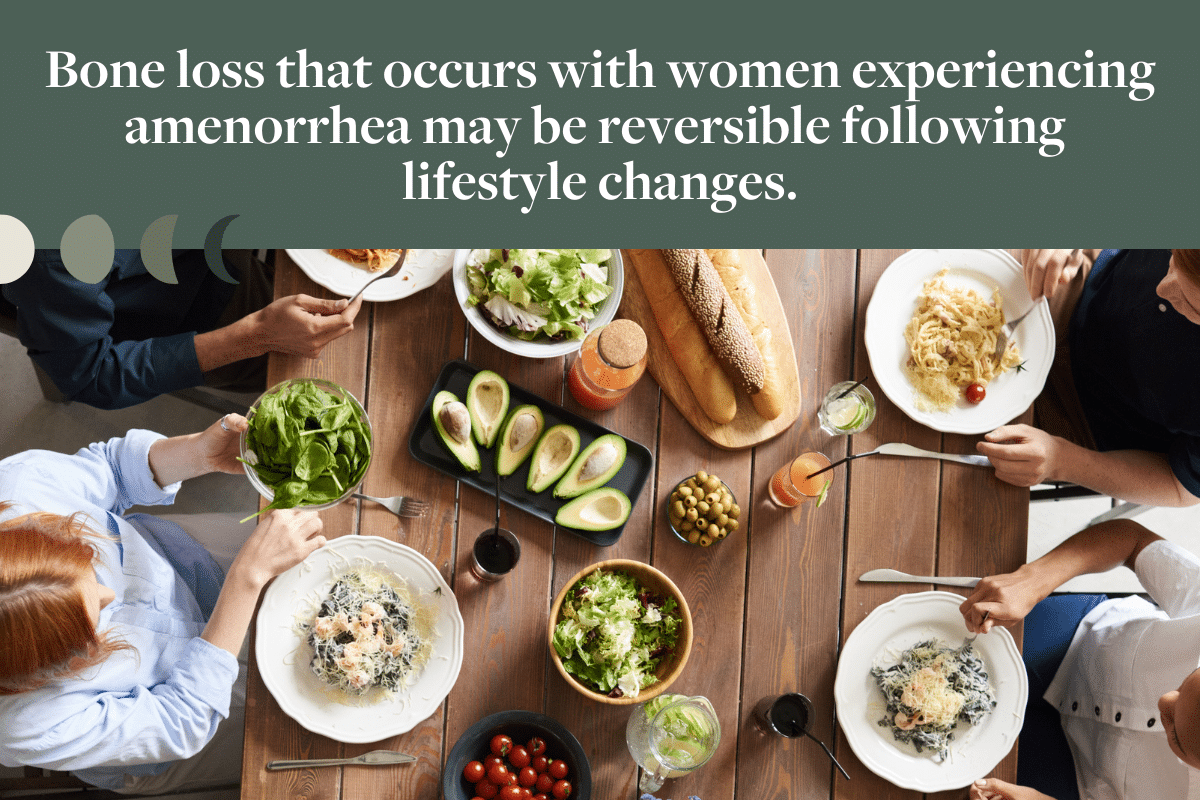What is hypothalamic amenorrhea?
Hypothalamic amenorrhea (HA) is defined as the absence of the menstrual cycle in a woman of child-bearing age. HA can have dire health consequences, including decreased bone density and increased risk of fracture and early onset osteoporosis. We commonly see amenorrhea in women with eating disorders who chronically under-eat and/or over-exercise. Following a hypothalamic amenorrhea diet along with other lifestyle changes can help you get your cycle and your health back on track.
Products marked with an asterisk (*) are affiliate links. This means RBA earns a percentage of any sales made through those links, at no extra cost to you.

What contributes to amenorrhea?
Food Intake
Food intake plays a large role in period loss. Whether a result of restriction or over-exercising, under-eating starves your body of essential nutrients. When under-fed, your body prioritizes the energy needs of organs like the heart and the brain and shuts down other processes that it considers less important, like the menstrual cycle. Read on to learn more about hypothalamic amenorrhea diet changes you can make to get your period back.
Over-exercising
Amenorrhea is not just about low food intake. Women with amenorrhea often exercise more frequently, or with more intensity, than the average woman. Female athletes that train multiple times per week, like runners or gymnasts, may lose their periods as a result of over-training. It is a misconception that it is “normal” to lose your period when training for a marathon.
Eating a ‘regular’ diet (i.e. eating when you are hungry and stopping when you are full) may not be enough food to compensate for heavy exercise.
Low body fat/weight
It is possible to lose your period at a “normal” weight or in a larger body. Although it is more common to see women with low body fat and low body weight lose their periods.
Weight loss
While low body weight may cause you to lose your period, weight loss, in general, is a more common finding among amenorrhea sufferers. Losing 10 pounds, even years ago, can affect the loss of the menstrual cycle. Weight loss can occur as a result of both under-eating and over-exercising.
Stress
Physical stress like malnutrition, excessive exercise, rapid weight loss, and emotional stress like trauma can play a large role in period loss. Stress causes cortisol levels to rise and estrogen levels to fall, signaling your body to shut down your regular menstrual cycle.
Some other causes might include genetics, PCOS, and, in rare cases, pituitary tumors.

How is amenorrhea related to bone density?
Bone density and amenorrhea are linked in several ways. First, estrogen, a hormone that helps regulate your menstrual cycle, also helps regulate bone health. Estrogen does this in two ways: It stimulates bone formation and suppresses bone breakdown. When you lose your cycle, estrogen levels drop, which allows for more bone breakdown and less new bone formation. Birth control pills (estrogen-replacement pills) are not a cure for bone loss during amenorrhea. It is possible to get your period while on birth control and still be losing bone mass. The only exception to this is the estrogen patch, which has been shown to positively impact bone density. The second way amenorrhea and bone density are linked is through exercise. Exercise like resistance training has been shown to strengthen bones. However, in women with amenorrhea, exercise will further deplete bone density stores.
Testing for bone density levels
A DEXA scan is a non-invasive, x-ray-like procedure that examines bone mineral density. DEXA scans identify if any bone loss has occurred by measuring the thickness of your bones. Your DEXA scan results are an important tool your physician may use to diagnose osteopenia or osteoporosis.

Is amenorrhea and bone loss reversible?
Bone loss that occurs with women experiencing amenorrhea may be reversible following lifestyle changes. The longer you are experiencing amenorrhea the weaker your bones get. Addressing the cause of your amenorrhea as early as possible will help preserve bone mass. The Gold Standard for reversing amenorrhea is adequate food intake. The goal is to fully restore your nutrition. However, having your menstrual cycle does not inherently mean that your body weight has fully been restored. Other signs that you are recovering from hypothalamic amenorrhea include stronger hunger and fullness cues, improved mood, and increased libido.
Hypothalamic amenorrhea diet: Food and lifestyle changes
Weight restoration
Restoring body weight requires more calories than you may expect or be used to. Your body’s metabolism (RMR or resting metabolic rate) will speed up quickly once you begin to re-feed it. It will need a lot of fuel to rev up processes that it had previously slowed or stopped due to inadequate calories, like your menstrual cycle.
Focus on eating high-calorie, low-volume foods that deliver a lot of energy in small amounts. Examples include eating full-fat dairy products, replacing water with juices or smoothies, and mixing in peanut butter, cream cheese, or butter into your foods. Energy bites are also a fun, tasty way to increase your calories throughout the day.
Going from under-fueling to adequately fueling might feel strange at first, so it’s important to know what to expect. When you begin to eat more, you might feel full quickly after eating even small portions. You may also experience swelling, bloating, constipation, and acid reflux.
Although most of these are temporary, don’t hesitate to reach out to your care provider regarding ways to soothe any discomfort.

Eat calcium-rich foods
Dairy products like milk, yogurt, and cheese are calcium-rich options. Some other sources of calcium include leafy greens like kale, seeds like sesame and chia*, beans and lentils, almonds, canned salmon*, and tofu.
You may be wondering if a calcium supplement is right for you. Calcium is best absorbed in food-form. If you are not eating enough calories, calcium foods alone will not help improve your bone density.
It is also important to note that we only absorb about 300-500mg of calcium at a time, so supplements with higher amounts are not helpful. Be aware that calcium supplements may cause constipation and upset stomach. Work with your dietitian to choose quality supplements that are better tolerated and absorbed as you work on improving your nutrition.
Exercise less
It is important to scale back on the frequency and intensity of exercise, especially cardiovascular exercise. Even moderate exercise paired with inadequate energy intake, stress, and genetics can lead to amenorrhea in some women, so taking time off from the gym, team practice, and training is important.
Stress relief
Your body’s reaction to high-stress levels may be affecting your ability to restore a healthy weight. By nourishing your body with adequate food and resting your body from exercise you are already lowering your body’s response to physical stressors.
Emotional stress may also be wreaking havoc on your hormones. Consider ways to lower your stress levels at home, school, and at work like meditation, yoga, deep breathing exercises, or aromatherapy. We love using Lavender Essential Oil* from Young Living to lower stress levels!

Barriers to following a hypothalamic amenorrhea diet
If you are currently experiencing barriers to consuming enough food to fuel your body, take a moment to answer the following:
- Do you have forbidden foods or food groups that you don’t allow yourself to eat?
- If you eat one of these foods, do you feel guilty and anxious afterward?
- Is your eating dependent on exercise – do you allow yourself to go out to dinner only if you go to the gym to burn off the extra calories or skip other meals?
- Do you cook separate meals for yourself? Or avoid social gatherings because you don’t want to deal with the food or people asking why you are not eating?
- Have you trained yourself to ignore your hunger – getting pleasure out of not “caving in?”
If you answered ‘yes’ to any of the above, consider reaching out to a dietitian who can help you heal your relationship with food.
Hypothalamic amenorrhea diet resources
Our dietitians recommend these resources to make managing your condition easier:
Schedule a consultation with one of our experienced dietitians for yourself or a loved one struggling with hypothalamic amenorrhea.
Sources:
“No Period. Now What: A Guide to Regaining Your Cycles and Improving Your Fertility” by Nicola J. Rinaldi
Gaudiani JL. Sick Enough: A Guide to the Medical Complications of Eating Disorders. Routledge; 2018.
Blog contributions from Kristin Jenkins MS, RDN, LDN
Thoughtfully reviewed and updated on May 10, 2022
Dana uses her advanced training in functional nutrition and food sensitivities to help her clients love and trust food again as they heal from years of painful symptoms that have dominated their lives. Co-author of Nourished: 10 Ingredients to Happy, Healthy Eating and Cooking with Food Sensitivities Survival Guide.





This is educating Thanks.
Thank you. We are glad you are enjoying our blog.